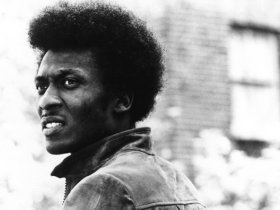With the film celebrating it's 40th year in the US this year, we look back on how the story of the song unfold…as told by Jimmy Cliff;
"In 1969, I was at Dynamic Sounds Studio in Kingston recording a song I had written, You Can Get It If You Really Want. When we finished, I walked outside and met a gentleman named Perry Henzell, who had been waiting for me. He said he was making a movie and asked if I could write music for it.
By that point, I was pretty well known in Jamaica and the U.K. I had recorded quite a few hits. I had always wanted to be a movie actor, so I asked Perry to send me the script. When I read it, I felt I had known Ivanhoe Martin [the main character] all my life. In the script, he was a guy from the country who came to the city to make it as a musician but was held back by the trickery of a record-company owner. Eventually Ivan turns to crime and is killed at the end.
I told Perry that the script was great, and he decided to cast me as Ivan. The film at the time was called Hard Road to Travel, after one of my songs, and we filmed over the next year or so. When we shot the scene where Ivan cuts the bicycle-store owner who came on really hard, a line came to my mind—"the harder they come." In real life, if you come on hard like that, you're going to die hard.
When I told Perry my line, he loved it. He thought it was a stronger film title and asked me to write a theme song to go with it. He didn't give me much time—just two days—because he wanted to film me singing it in the studio with the band for the movie.
The first development of my song is actually in the movie—when the guitarist and I are rehearsing a song in the church. That's an early draft of "The Harder They Come." The rest of the music came fast. When I have a title, the rest always comes very fast. I'm quite good at melodies.
The lyrics came from my past. I grew up in the church and had always questioned what they were telling me. Like the promise of a pie in the sky when you die. The second verse about oppressors trying to keep me down kind of reflected my own life—coming out of the ghetto in Jamaica and fighting the system. I wanted the song to have a church feel and to reflect the environment I grew up in—the underdog fighting all kinds of trickery.
What you see in the movie—in the recording studio—is the song being recorded. You're watching the real thing. Gladstone Anderson was on piano, Winston Wright was on organ, Hux Brown was on lead guitar, Ronny Bop played rhythm guitar, Jackie Jackson was on bass and Winston Grennan was on drums."
Sourced at The Wall Street Journal
Gearing up for a special theatrical re-release beginning September 5th to celebrate the 40th anniversary, there is a poster competition currently on it's way to design a commemorative poster for the film.
You can keep up-to-date with the latest happenings at the official website, their Facebook page and their Twitter account.













 less
less
 more
more